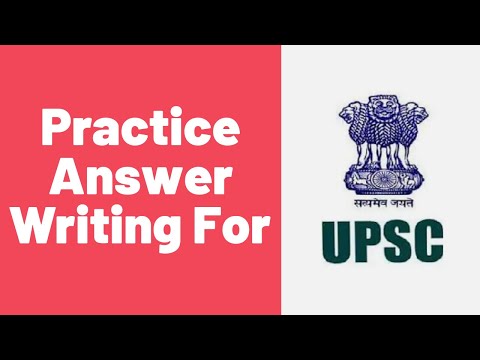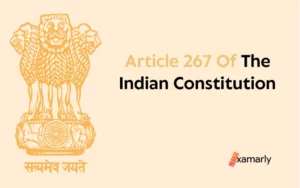Are you wondering how to start answer writing practice for UPSC?
If you’re an aspiring civil servant in India, then you’re probably aware that cracking the Union Public Service Commission (UPSC) exam is no easy feat. With a vast syllabus and fierce competition, it’s easy to feel overwhelmed and unsure of where to begin.
That’s where answer writing practice comes in. Answer writing is an essential part of UPSC preparation, as it helps you develop the skills necessary to articulate your thoughts effectively and concisely.
In this article, we’ll take a look at some tips on how to start answer writing practice for UPSC, including choosing the right resources, selecting relevant topics, and structuring your answers effectively.
So, let’s dive in and get you started on your journey towards acing the UPSC exam!
- UPSC Mains Exam Pattern
- Why Do You Need Answer Writing Practice for UPSC Mains?
- Fruitful Benefits of Answer Writing Practice in UPSC
- How To Start Answer Writing Practice For UPSC Civil Services Main Tests?
- Techniques for Writing UPSC Mains Exam
- 1. Read Before You Write
- 2. Maintaining A Proper Outline Is Important
- 3. Avoid Shakespearean Language And Unnecessary Jargon
- 4. Being Original Is The Key
- 5. Avoid Too Many Quotations
- 7. Beware Of Generalizations
- 8. Regular Answer Writing Practice Keeps You Active
- 9. Extra Marks For Error-Free Writing
- 10. Manage Time Effectively
- 11. Use Relevant Examples and Data
- Conclusion
- Frequently Asked Questions
- How to start answer writing practice for UPSC Mains?
- How do I manage my time effectively during the UPSC main exam?
- How do I structure my answers in the UPSC main exam?
- What are some common mistakes to avoid when writing answers for the UPSC mains exam?
- How do I develop a clear and concise thesis statement for my answers?
- What are some effective techniques for using relevant examples and data in my answers?
- How can I improve my answer writing skills for the UPSC mains exam?
- What are some tips for managing stress during the UPSC main exam?
- How can I make my answers stand out in the UPSC main exam?
- What should I do if I get stuck while writing an answer in the UPSC mains exam?
UPSC Mains Exam Pattern
Here is the pattern for qualifying and optional papers for UPSC mains:
| Exam Component | Paper Name | Duration | Total Marks |
| Written Exam | Paper A: Indian Language (Qualifying) | 3 hours | 300 |
| Written Exam | Paper B: English (Qualifying) | 3 hours | 300 |
| Written Exam | Paper I: Essay | 3 hours | 250 |
| Written Exam | Paper II: General Studies I | 3 hours | 250 |
| Written Exam | Paper III: General Studies II | 3 hours | 250 |
| Written Exam | Paper IV: General Studies III | 3 hours | 250 |
| Written Exam | Paper V: General Studies IV | 3 hours | 250 |
| Written Exam | Paper VI: Optional Subject Paper 1 | 3 hours | 250 |
| Written Exam | Paper VII: Optional Subject Paper 2 | 3 hours | 250 |
| Personality Test/Interview | – | – | 275 |
Note: The Indian language and English papers are qualifying in nature and the marks obtained in these papers are not considered in the final merit list.
The qualifying papers are of matriculation level and the marks obtained in these papers are not added to the final merit list. The personality test or interview carries a weightage of 275 marks out of the total 2025 marks.
Related Post: UPSC Exam Pattern
Why Do You Need Answer Writing Practice for UPSC Mains?
There are 20 to 25 questions in UPSC and the answer to each should be 200 to 250 words.
You will get 3 hours to complete each of the 9 papers in UPSC.
You have to frame and draft an answer along with maintaining coherence in the answer without deviating from the question and that too in 3 hours.
Ask yourself this question: Do you have time to waste in the exam hall thinking about all this or do you have to practice this ‘art of answer writing’ beforehand so you can utilize this time in writing a rational answer orbit around the question itself?
In short, you need a practice that will enable you to write a complete answer which comprises these qualities:
- Coherent
- Rational, relevant
- Within a word limit
Fruitful Benefits of Answer Writing Practice in UPSC
Practising effective answer writing is essential for UPSC (Union Public Service Commission) mains for several reasons. Here are some of the advantages of practising effective answer writing in UPSC mains:
- Better Time Management: Answer writing practice helps you to manage your time more effectively. The UPSC mains exam has a time constraint, and effective answer writing enables you to present your answers in a well-structured manner within the allotted time.
- Improved Communication Skills: Writing is an essential mode of communication, and practising answer writing helps you to improve your communication skills. By practising answer writing, you can learn how to articulate your thoughts more precisely and coherently, which is crucial in the UPSC main exam.
- Increased Clarity: Practicing answer writing helps to increase clarity in your thought process. It enables you to organize your ideas and present them in a structured manner, thereby increasing the clarity and readability of your answer.
- Enhanced Retention: Answer writing practice helps you to retain information better. The process of writing helps to reinforce the concepts and ideas, thereby improving your retention and recall ability.
- Better Preparation: Practicing answer writing is an effective way of preparing for the UPSC mains exam. By practising, you can identify your strengths and weaknesses, and work on them accordingly. It also helps you to gain familiarity with the exam pattern and format, which is essential for better preparation.
In conclusion, practising effective answer writing in UPSC mains is essential for better time management, improved communication skills, increased clarity, enhanced retention, and better preparation.
It is a valuable tool that can help you to achieve success in the UPSC mains exam.
Learning Or Practicing: Which One Works in UPSC?
Learning to write good answers is equally important as studying for exams. At the end of the day, what matters the most is what you have written on the paper, rather than what you have read and learned while preparing for UPSC Exam.
In short, you get marks for how you have framed your views into an answer and not for the countless hours you have put into preparing for UPSC. So without laying much stress, we can understand the importance of the art of writing answers.
The pressure of exams can be daunting in students’ life. The art of writing is a useful tool for students who are juggling between revision, remembering, or recalling the chief information.
Writing not only boosts your focus but also improves your recalling capability. They are accommodating from an exam point of view as they positively impact the pieces of information/ facts you have learned and retained.
Before practising answer writing, you should have a strong grip on your subject. In that case, Examarly will be beneficial for you as it helps you prepare for UPSC effectively by providing you with your customized plan and helping you to keep an eye on your progress at every step.
Related Post: How To Complete UPSC Mains Paper in 3 Hours? – A Clear-Cut Guide
How To Start Answer Writing Practice For UPSC Civil Services Main Tests?
How to start answer writing practice for UPSC? This is a question that is asked by many aspirants.
The UPSC Mains answer can be challenging, and a significant number of candidates struggle to complete them due to inadequate time management during the exam.
Therefore, it is essential for aspirants to engage in prior practice and develop a strategy for managing their time effectively while answering questions.
Answer writing practice is an essential part of preparing for the UPSC Civil Services main tests. To start answer writing practice for the UPSC Civil Services main tests, you need to follow some effective steps.
Firstly, it is essential to understand the exam pattern of the UPSC mains exam. Understanding the exam pattern will help you to prepare effectively and manage your time during the exam.
Read More: 5 Essential Steps: How to Write an Essay in UPSC Mains
Master Your Writing Skills in Answer Writing Art for UPSC Mains
Once you have understood the exam pattern, the next step is to read and analyze the previous year’s question papers and types of questions.
Analyzing the previous year’s question papers will help you to understand the type of questions asked in the exam. It will also help you to identify the areas of your strength and weaknesses.
After analyzing the previous year’s question papers, you need to research and collect information related to the topics that are relevant to the UPSC mainS exam.
You can use various sources such as newspapers, magazines, and online resources to collect information.
Once you have collected the required information, the next step is to organize and structure your answer. It is essential to have a clear understanding of the question and to present your answer in a structured manner.
Your answer should have an introduction, main body, and conclusion. The introduction should provide a brief overview of the topic, the main body should present your arguments and evidence, and the conclusion should summarize your answer.
Related Post: Score Booster Handy Tips For How To Write Answers In UPSC Mains 2022
Check out this video: How To start answer writing practice for UPSC?
Techniques for Writing UPSC Mains Exam
1. Read Before You Write
It is a common saying that “A good writer is also a good reader”. The more you read, the more you will get an idea of different content and perspectives.
Having a perspective is necessary for a good answer in UPSC Mains. Answer writing in UPSC demands a proper outline, structure, quotes, facts, data, and opinions along with the proofs of whatever you are writing.
Reading before writing familiarizes you with the different writing styles and with various content subconsciously which you can use in the final Mains examination. Refer to the UPSC syllabus first to get the idea of “What exactly to read ?”.
2. Maintaining A Proper Outline Is Important
Outline means the structure of your blog consisting of an introduction, a body, and a conclusion. Coherence is needed among these three sections while writing the answer.
There are 9 papers on different subjects having different natures of answers. There’s an essay paper also demanding a lot more of your opinions in comparison to previous papers.
The catch is to understand the nature of answer writing of different papers and genres and write it in order with coherence complementing each other. In this way, you can maintain the consistency of an answer.
3. Avoid Shakespearean Language And Unnecessary Jargon
Writing to fill word count is a bad practice and it can lower your chances of selection for the interview round of UPSC CSE. Use simple language and convey your answer clearly.
Avoiding unnecessary technical answers and cliché is the best practice while answer writing. Showing off your knowledge does more harm than good.
You are not there to impress the checker with your technical writing skills, instead, you must write in a language that contains facts that are relevant to your given question and quite understandable for everyone.
4. Being Original Is The Key
This point is self-explanatory as UPSC demands a subjective answer with full objectivity in answer writing. Writing your opinions in your own words without any generalization is the key to success in UPSC Mains.
This will also help you in your interview round because your opinions reflect your personality and your thoughts.
Keeping your answer original without copying it from any news source or book is the best form of practice and also inventing your stuff should also be avoided.
However, keeping your creativity alive is also very important while writing answers for mains.
5. Avoid Too Many Quotations
You must give quotes in your answers but in a balanced and well-structured way. Quotes only show your knowledge and scholarliness.
However, you must use only a few quotes. Instead, you can write facts and data along with your opinions for a better answer. You can use metaphors, similes, and quotes but only when it seems too necessary to mention.
7. Beware Of Generalizations
Always remember that you are writing for a government exam, a prestigious exam such as UPSC CSE. You should avoid generalizing or writing based on urban dictionaries and crowd talks.
Always substantiate your sayings and opinions with proven facts and data. Use quotes, metaphors, and similes as mentioned in the above point, but only where it is necessary.
There should be no place for your personal opinions unless asked in the question. Formulate your answers in such a way that it matches the context of the question.
8. Regular Answer Writing Practice Keeps You Active
When you have 9 papers to crack in a single stage of an exam, then it becomes a necessity to write and practice it more and more. Without practice you will get exhausted in the main examination of UPSC Mains and exhaustion leads to a lack of ideas and points.
To avoid this, you must start giving different online mock tests or various coaching centres’ test series to practice writing for a better-structured answer. In writing, you will get the idea to break down the contents with relevant data and a proper outline.
You can write some answers in small paragraphs or points but before that, you must get some idea about the nature of the questions asked in the examination. To get this idea, it is very important to practice answer writing for UPSC Mains religiously.
Similar Post: How To Prepare For UPSC Prelims And Mains Together Like An Absolute Pro!
9. Extra Marks For Error-Free Writing
It is expected from a graduate or aspirants holding higher degrees than graduation to write their answers error-free as much as possible. It is not always easy to write 100% error-free answers but the errors should be avoidable instead of non-avoidable basic grammatical mistakes.
When you are writing for such a prestigious exam, it becomes your responsibility to write on point without making any silly mistakes. Mere knowledge is not enough to crack the UPSC exam.
You need to convince the examiner who is correcting your answer booklet that you have good knowledge and ideas to become a first-class civil servant. This is possible by writing simple yet effective answers that not only give the required information but also are a pleasure to read as well.
Also Read: Score Booster Handy Tips For How To Write Answers In UPSC Mains
10. Manage Time Effectively
Managing your time effectively during the UPSC mains exam is crucial for success. It involves allocating your time to each question based on its weightage and the time available, sticking to the allocated time for each question, and ensuring that you complete the exam within the given time limit.
For example, let’s say you have three hours to complete a paper that contains three questions, each with equal weightage. In this case, you can allocate one hour to each question.
However, if one of the questions has more weightage than the other two questions, you should allocate more time to it.
For instance, if one question has a weightage of 50 marks, and the other two questions have a weightage of 25 marks each, you may allocate 90 minutes for the 50 marks question and 45 minutes for each of the 25 marks questions.
Once you have allocated time to each question, you should stick to the allocated time and move on to the next question once the allocated time is over. This will help you to complete the exam within the given time limit and ensure that you have attempted all the questions.
Moreover, while managing your time, it is important to keep track of the time and adjust your pace accordingly.
For instance, if you are spending more time on a particular question, you may need to pick up the pace for the remaining questions to complete the exam within the given time limit.
11. Use Relevant Examples and Data
n the UPSC mains exam, using relevant examples and data to support your answer is a great way to demonstrate your understanding of the topic and make your answer more convincing.
When you use examples and data, it shows that you have a clear and in-depth understanding of the subject and have researched the topic thoroughly.
To use relevant examples and data, it’s important to first understand the question and what it’s asking.
You should then identify the key points and arguments that you want to make in your answer. Once you have a clear understanding of what you want to say, you can look for examples and data that support your arguments.
For instance, if the question is about the impact of climate change on agriculture, you may want to use data to demonstrate how rising temperatures have led to a decline in crop yields in certain regions.
You can also use relevant examples of how farmers are adapting to changing weather patterns, such as switching to crops that are more resistant to drought or investing in irrigation systems.
Conclusion
In conclusion, effective answer writing is a critical skill for success in the UPSC mains exam. By following the techniques mentioned above, you can improve your answer writing abilities and increase your chances of achieving a high score.
To start answer writing practice for UPSC mains, it’s important to begin by understanding the question and its requirements, and then developing a clear and concise thesis statement.
You should then use a structured approach to organize your answer, using headings and subheadings to make it more readable and coherent.
Additionally, managing your time effectively and using relevant examples and data can help to strengthen your argument and make your answer more convincing.
It’s important to remember that answer writing is a skill that requires practice and discipline.
By dedicating time to practice and seeking feedback from others, you can improve your answer writing abilities and boost your confidence in the UPSC mains exam.
Overall, starting answer writing practice for UPSC mains is a challenging yet rewarding process that can help you to achieve your goals and succeed in this highly competitive exam.
By using the techniques mentioned above and committing to consistent practice, you can increase your chances of success and reach your full potential as a UPSC aspirant.
Frequently Asked Questions
How to start answer writing practice for UPSC Mains?
The best way to start answer writing practice for UPSC mains is to first read and understand the question, develop a clear thesis statement, and then use a structured approach to organize your answer.
How do I manage my time effectively during the UPSC main exam?
To manage your time effectively during the UPSC mains exam, allocate time to each question based on its weightage and the time available. Stick to the time allocated for each question and ensure that you complete the exam within the given time limit.
How do I structure my answers in the UPSC main exam?
To structure your answers in the UPSC mains exam, use headings and subheadings to break down your answer into clear and concise sections. This makes it easier for the examiner to read and understand your answer.
What are some common mistakes to avoid when writing answers for the UPSC mains exam?
Some common mistakes to avoid when writing answers for the UPSC mains exam include not reading the question carefully, not using relevant examples and data, and not managing your time effectively.
How do I develop a clear and concise thesis statement for my answers?
To develop a clear and concise thesis statement for your answers, read the question carefully and identify the key points and arguments that you want to make. Your thesis statement should clearly and succinctly summarize the main idea of your answer.
What are some effective techniques for using relevant examples and data in my answers?
Some effective techniques for using relevant examples and data in your answers include understanding the question and what it’s asking, identifying key points and arguments, and using accurate and credible sources.
How can I improve my answer writing skills for the UPSC mains exam?
To improve your answer writing skills for the UPSC mains exam, practice consistently, seek feedback from others, and study past papers to understand the format and structure of the exam.
What are some tips for managing stress during the UPSC main exam?
Some tips for managing stress during the UPSC mains exam include getting enough sleep, eating well, taking breaks when needed, and practising relaxation techniques such as deep breathing or meditation.
How can I make my answers stand out in the UPSC main exam?
To make your answers stand out in the UPSC mains exam, use relevant examples and data to support your arguments, write clearly and concisely, and use a structured approach to organize your answer.
What should I do if I get stuck while writing an answer in the UPSC mains exam?
If you get stuck while writing an answer in the UPSC mains exam, take a deep breath and re-read the question. Break down the question into smaller parts and focus on answering each part separately. If you are still struggling, move on to the next question and come back to the difficult one later.







